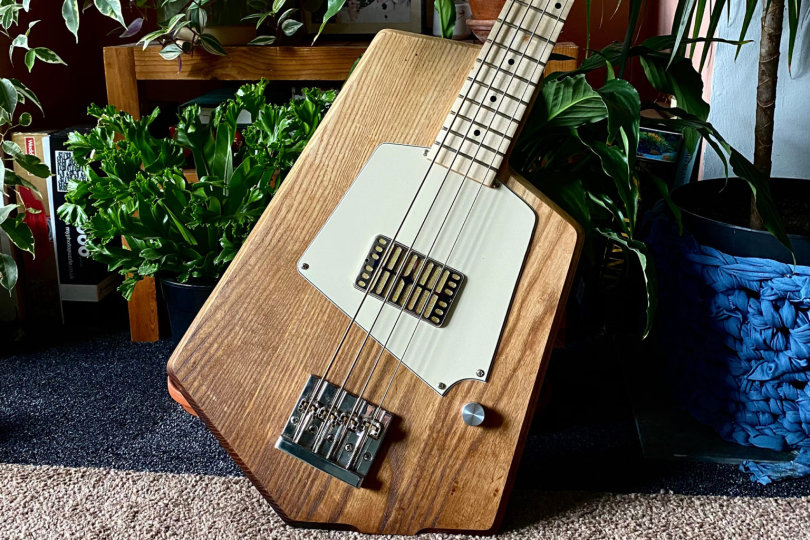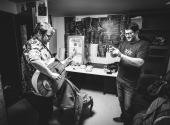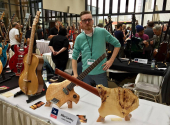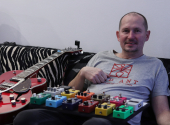
Dreamstruments #27: Brute Bass Guitars
What era would you describe as the golden age of guitar design? Was it the 1950s, when the most important models were made? The wild seventies, when established manufacturers ventured into crazy experiments? According to David Telfer, the golden era was the 1960s. His instruments reveal his fascination with experimentation, and also his second job – creative director in the clothing industry. For Brute Bass Guitars, David often combines traditional materials and shapes with those that are common, but not typical in the guitar world.
Brute, the name of bass guitars by British designer David Telfer sometimes fits perfectly, as with the instruments featuring the 8-bit design, but sometimes seems rather ironic, as in the case of the elegant and light-looking guitars made of acrylic plates. Perhaps this is the source of David's desire to keep developing his branding and not be tied to a fixed form of his logo. As he says, with the portfolio of models he offers, it's only natural that each piece needs something different. "A handwritten note in the neck pocket or on the back of the headstock is a much nicer touch than spending loads on a branding iron which is quite a permanent investment," said David for the Guitar.com magazine.
Step by step, in his own way
How does the creative director of a well-known clothing brand become a guitar maker whose work is shared by music websites and magazines around the world? It starts with a love of handiwork, desire to delve into some basic projects like changing the colour of your own bass, then adding nitro lacquer and more and more steps. This results in building your own instruments out of an ash shelf that was discarded by a Sunspel store, or perhaps out of acrylic sheets that the original owner threw away after one use.

Upcycling sets the direction
The material that David uses for his basses and guitars could be described as sustainable. Apart from using high-end hardware that is locally sourced (such as Mojo Pickups), David is not exaggerating when he says he regularly goes to landfills, and the "upcycled" material often shapes the design of his instruments. The previously mentioned ash shelf gave birth to a bass guitar named Hex. As the name suggests, it's a hexagonal shape with a shorter lower bout for easier access to higher positions – a design that is certainly true to the name Brute, as it is remotely reminiscent of mid-twentieth century Brutalist architecture.

Tetriscasters are in the lead
But the Hex is certainly not the "tip of the iceberg" of David's lineup when it comes to rough shapes and a deliberate lack of smooth or aerodynamic design of the guitar body. This place is held by instruments reminiscent of old computer animation, or the world of Minecraft, basses and guitars inspired by 8-bit animation. Perhaps the strikingly sharp teeth give the impression of calculated provocation, but the result is unmistakably charismatic, though certainly not for everyone.
However, Brute Bass Guitars are not just these rough shapes. The Plexigon basses, made of laminated Plexiglas, give the opposite impression. The combination of transparent plastic with a maple fingerboard lends the instrument an oddly light aura. It looks as if it could be blown away by the lightest breeze. This is where the name Brute "frays at the edges" a bit, but David has a perfectly logical explanation for it: "If I were doing this for a living, it would certainly be more efficient for me to limit the number of shapes and materials. But I enjoy trying to create something new, or redesign something old, and see the reaction. I enjoy being able to make unique shapes for my customers. Shapes that fit my aesthetic requirements. In some ways, it's the repetition that's hard for me because I don't enjoy it as much as creating new shapes," he says.

To let the hobby remain a hobby
In the same breath, David admits that he doesn't see making instruments as his job, that's what his position at Sunspel is for. He says he can't imagine giving more time to bass guitars than he does now. Maybe that's why his creative work feels so fresh. Like any good hobby, Brute's instruments reflect the enthusiasm and passion of their creator more than the labour that well-executed hobbies can entail. On the other hand, it's also the reason why Brute Bass Guitars has no official website, no Facebook, no other channels, just a hugely entertaining TikTok and an Instagram account. Business is the last thing on the list...

If you have found an error or typo in the article, please let us know by e-mail info@insounder.org.





